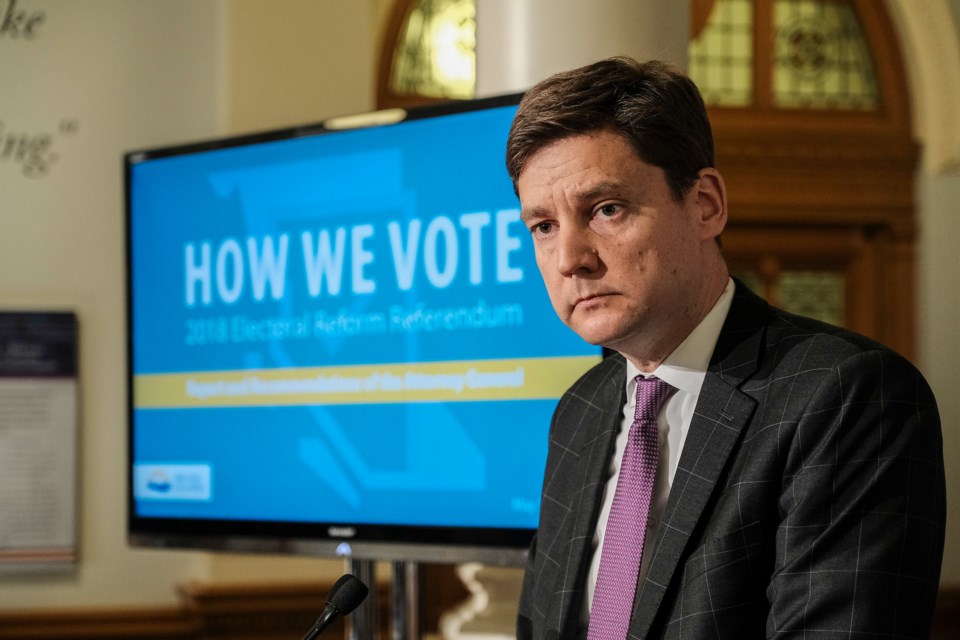When analyzing an ongoing campaign, it’s only natural to compare and refer to the last one. After all, if the Canucks are struggling in the second period, it only makes sense to see if that’s consistent with their last game.
In BC politics, the temptation to look back to the 2017 election is strong. Not only was it the most recent, but 2017 was particularly newsworthy: full of twists and turns, historic, and transformative. At least one excellent book was written about it.
Not to say there’s nothing to learn from that campaign, but it was waaaaay back in 2017. Arguably the most pivotal figure, former Premier Christy Clark, is long gone from the scene. So is former Green leader Andrew Weaver, if much more recently and much less silently. But the next year was dominated by another campaign: the proportional representation referendum.
Start with the one major and obvious difference. 2018 presented something of a handicap match: the NDP and Greens poured everything into the Yes campaign; the BC Liberals went all in on No. Two years later, the NDP and Greens aren’t on speaking terms, much less holding joint events.
A (mostly) three-way contest isn’t a binary yes-no affair. But setting that aside, there are similarities.
First, a dependency on mail-in ballots. As of the time of this writing, Elections BC has received over 620,000 requests, already an order of magnitude more than the 2017 election. If you’re reading this a few days from now, it will be still more. By the end, as many as 35% of all votes could be cast by mail.
That’s fine – and there’s obviously a compelling reason. But voting by mail has its own patterns, most of which are more likely to go BC Liberal.
Second, the polling looks awfully familiar. I couldn’t find a better aggregate of pre-referendum polls than Wikipedia, but they tell the same story: the Yes side seemed to have an insurmountable lead, right up until the end.

When the dust settled, it was close to the opposite: the No side had won convincingly, with more than 60% of the vote. In 24 hours, the NDP went from saying PR was crucial for the province’s very future to conceding the idea was “finished.”
Third, the debate will be crucial. Yes, this is always true of provincial campaigns, elections and otherwise. But in a pandemic, it will be many voters’ only point of contact with the respective leaders or even their candidates.
Going into the 2018 one-on-one prop rep debate with Premier John Horgan, BC Liberal leader Andrew Wilkinson had been on the job about a month. Many observers thought the more experienced Horgan would handle him easily.
But Horgan was handicapped by having to defend a major flaw: major details (like how many votes you’d get) were left to decide after the referendum. Pressed for answers, Horgan squirmed uncomfortably, simply because there weren’t any to give. You can hide deficiencies like this in speeches; not so in debates.
Next week, Horgan will again have a handicap: the very reason he’ll be there in the first place. The entire province knows why there’s an election underway: the NDP saw an opportunity to seize a majority government. But the NDP have bent over backwards to insist that’s a happy side bonus at best, not the motivation.
In 2018, one of the NDP/Green PR campaign’s central problems with was how shamelessly they admitted it would benefit them. From the Vancouver Sun:
The only way to keep the NDP in power is to change the voting system, according to NDP MLA Rick Glumac, who told the legislature recently: “All the good work that we’re doing right now could be undone if we stick with the first-past-the-post system.”
Beware the MLAs. They are too invested in obtaining and holding power to be trusted to give you the straight facts on PR. Selecting an electoral system just to help one party have a better chance of winning is a horrible way to vote, no matter your political affiliations.
What the Globe and Mail called “Canada’s least honest attempt at electoral reform” sounds awfully familiar to Horgan insisting his decision to force an election was made long after he filmed campaign ads. And anyway, it was the Greens’ fault for opposing this idea. Or was it that one, or possibly both?
All that said, Horgan is a talented, charismatic debater who showed in 2017 he learns from past mistakes. He won’t be easy to pin down, but this will be the first time he’ll be facing not only Wilkinson, but new Green leader Sonia Furstenau, who will point to CASA, Horgan’s various assurances, all but calling him a liar and dare him to say otherwise.
These lessons aren’t necessarily transferable. After all, in 2018 Nanaimo voted just over 54% to keep First Past the Post, raising some historically unlikely hopes the BC Liberals might juuuuust pull off a high-stakes byelection win there. Less than two months later, the NDP held onto the seat by ten points.
But between the PR referendum and the last two provincial elections, it’s worth noting the side that expected to win, didn’t.
Maclean Kay is Editor-in-Chief of The Orca
SWIM ON:
- Maclean Kay last pondered (and polled) the purely hypothetical: what if Dr. Bonnie Henry ran one of BC's three major parties?
- Still the best analysis of what happened in the 2018 Proportional Representation referendum, if we do say so ourselves. And we do.
- The NDP's Achilles heel this campaign is why we're having the campaign at all.



